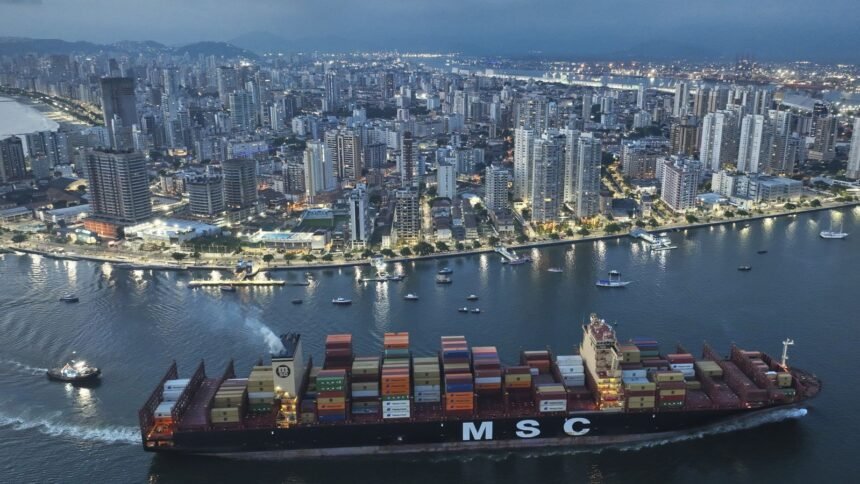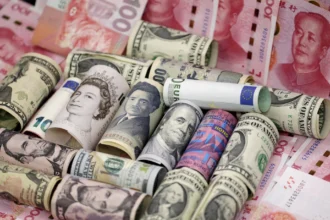US President Trump’s threat to impose a 50 percent tariff on Brazil, to come into effect on August 1, was an extraordinary act of imperialist intervention which adds a new dimension to the economic war against the world being waged by his administration.
It came after Trump had sent a series of letters to US trading partners, friend and foe alike, announcing that major tariffs would go ahead from the beginning of next month under the banner of “reciprocal tariffs.”
The letter to Brazil, however, directly linked the tariff threat to the trial of former fascist president and Trump ally, Jair Bolsonaro, for his January 8, 2023 coup attempt. It also attempted to justify the threat with a reference to Brazil’s “unsustainable trade deficits against the US”—a complete nonsense given Brazil is one of the few countries with which the US enjoys a consistent trade surplus, amounting to $7.8 billion last year.
The measures against Brazil will add to the growing uncertainty and fears in financial markets as to where the tariff war is leading, raising further questions about the stability of the US dollar as the global reserve currency.
These concerns were given voice by Thierry Wizman, a global foreign exchange strategist at the Australian financial conglomerate Macquarie Group to the Australian Financial Review last week.
He said the linking of the tariff to what Trump claimed was a “witch hunt” against Bolsonaro set a “scary precedent.”
“This is outside the guardrails,” he said. “Now you have another rationalisation for tariffs, which is to influence or inform domestic political outcomes, or, for that matter, domestic judicial outcomes.”
The AFR noted in its report that Wizman had pointed out that Trump had used non-economic arguments against other countries—Canada, Mexico and Colombia. The US imposed tariffs on the grounds that they were not doing enough to combat the movement of the drug fentanyl into the US. However, the impost on Brazil was the first direct political hit on another country.
This could set a precedent for tariff levies based on politics and would serve to undermine confidence in the US dollar as the global reserve currency about which Wizman has previously warned.
“If this administration is starting to attack political rivals, to dig deeply and sort of inject itself into the politics of a foreign country and the judicial proceedings of a foreign country, of course, it deleterious for the dollar.”
The US, of course, has a long and bloody history of “injecting” itself into the politics of countries around the world. But it has done so under conditions where the dollar ruled as the dominant global currency.
Now that role is under challenge, not least because of the accelerating rise of US debt and the economic and financial turbulence set off by Trump’s economic and tariff war. In April when the “reciprocal tariffs” were first announced there was a significant spike in the interest rate on US Treasury debt which, contrary to what happened in previous “normal times,” led to a selloff of the US currency.
This points to another reason for the targeting of Brazil. It has been a central player in the efforts of the BRICS group of countries—initially comprising Brazil, Russia, India, China and South Africa, now expanded to 11 countries, including Iran—to develop a means of international payments outside the dollar system.
It was neither accidental nor coincidental that the attack on Brazil, whose president Luiz Lula da Silva has been one of the most prominent opponents of dollar dominance, came at the end of BRICS summit in Rio de Janeiro which committed itself to continue to lessen dollar dependence.
The maintenance of dollar dominance is a key issue for Trump. During the election campaign he said losing it would be the equivalent of losing a war. Last November, before he had been inaugurated, he warned that countries which attempted to create a BRICS currency or any other currency “to replace the mighty US dollar” would face 100 percent tariffs.
The latest round of tariffs included an extra 10 percent on BRICS countries.
According to a report on Politico, the issue was discussed at a Cabinet meeting last Thursday, the day after the 50 percent tariff hike against Brazil was announced. While the immediate threat of a dollar alternative was downplayed, Trump nevertheless raised its importance.
Politico said he told the meeting: “BRICS is not, in my opinion, is not a serious threat. But what they’re trying to do is destroy the dollar so that another country can take over and be the standard, and we’re not going to lose the standard at any time.
“If we lost the world standard dollar, that would be like losing a war, a major world war, we would not be the same country any longer. We’re not going to let that happen.
“I’m just saying, if people want to challenge it, they can, but they’re going to have to pay a big price, and I don’t think any of them are willing to pay that price.”
The Politico report cited comments by Lelan Lazarus, a former special assistant to the head of US Southern Command who has made a study of Chinese-Latin American relations.
He said that Brazil’s increasing alignment with China on yuan-dominated trade and other issues “may be triggering alarms within Trump’s circle, especially among advisers who view global dollar supremacy as a pillar of US power.”
That view is not confined to Trump’s advisers. It is held in every section of the US ruling class and in all the institutions of the US imperialist state. Dollar supremacy has enabled the US to do what is not possible for any other country—to run up historically unprecedented levels of debt to finance its ever-expanding military capacity and the billions it has spent on corporate bailouts.
The attack on Brazil should not, therefore, be seen as a one-off, but as an escalation in the drive by US imperialism to maintain its global supremacy, by economic, political and military means.
Sign up for the WSWS email newsletter





















